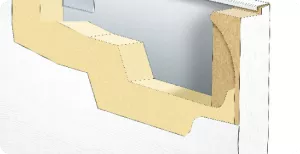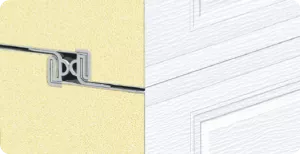You’ve decided to turn your garage into a workshop or a workout room, so you know you’re going to need a garage door that doesn’t let in too much cold air.
Here are 5 things you’ll need to look at closely when the time comes to buy a new garage door.
1. The type of insulation in the door

- There are 2 types of insulation that are commonly used in garage doors: polyurethane and polystyrene (also known as Styrofoam).
- Per inch of thickness, polyurethane provides a higher thermal insulation factor than polystyrene. Polyurethane is the same type of insulation as you’ll find in your front door. The blocks that protect your TV set when it’s in its box are made of polystyrene.
- Given the same door thickness, let’s say 1¾", polyurethane will give you an insulation factor of around R‑15 to R‑16, while polystyrene will only give you a factor of R‑8 to R‑9.
2. Door thickness
- The thicker your door is, the more insulation it can hold.
- For example, using the same type of polyurethane insulation, a 2" thick door will give you a resistance factor of 18. In a 1⅜" door, the R factor would only be 12.
3. Thermal break
- Even if you have the best insulation in your garage door, if the door has too many thermal bridges or breaks, that insulation will do little good.
- Thermal breaks are found in the end pieces of the door. Are the end pieces formed by steel caps or do they contain blocks of wood? Steel caps conduct the cold, even though you may think that they make your door more solid.
4. Door joints

- Where the door panels intersect, you need to check whether the 2 sheets are touching or if there is an actual thermal break between them.
5. Weather‑stripping on the outer frame of the door
- If there is weather‑stripping, it is really effective?
- Is the weather‑stripping installed on the outer frame of the door single‑flange or dual‑flange?
- By how many inches does it overlap the door? Ideally, at least 1 inch.
- Does it remain flexible even during cold weather?
So there, by and large, are the points you need to analyze when it comes to garage door insulation.
Please don’t hesitate to contact us at 616-453-0164 so we can help you determine your needs according to the project you wish to undertake. At Environmental Door, our technical advisors know about every type of garage door and are there to ensure your absolute peace of mind.








Add new comment